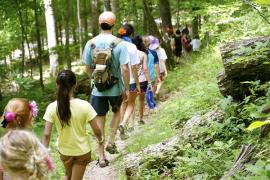Hello!
I hope everyone has had a fantastic winter. Spring is nearly here! I know many of you are preparing for a quickly approaching summer season. Keep up the great work! Aside from all the planning, the end of winter also means attending the annual ACA National Conference. This year’s conference in Nashville, Tennessee, was my first year attending the conference, and I’m excited to tell you all about it. In this blog, I will share what I saw and heard the ACA community talking about regarding research. Let’s get started.
The Future of Camp Research
I kicked off my conference Tuesday morning with “The Future of Camp Research Think Tank,” a pre-conference panel session hosted by Drs. Laurie Browne and Jim Sibthorp. This session focused on connecting what we do at camp to the broader youth development world and envisioning, as the title states, the future of camp research. Panelists included
- Dr. Karla Henderson, Professor Emeritus, North Carolina State University and Chair of ACA’s Research Advisory Committee
- Dr. Allison Dymnicki, Senior Researcher, American Institutes of Research
- Dr. Sabrica Barnett, Senior Researcher, Girl Scouts of the USA
- Dr. Karen Guskin, Senior Vice President of Research and Learning, Wyman Center
- Dr. Barry Garst, Associate Professor, Clemson University, currently serving on the National Academy of Sciences’ Committee on Summertime Experiences and Child and Adolescent Education, Health, and Safety
Each panelist shared their thoughts about the emerging trends and issues facing youth today, and what camp’s role is in positive youth development (PYD) and out-of-school time. A primary purpose of this panel discussion was to generate discussion around what future camp research should focus on. I think Karla Henderson summed it up well for us when she said, “We’ve already answered all the easy questions.” Here are a few key points from the panelists:
Look at old trends in new ways
- The need for understanding how to create greater equity
- Learn more about staff-camper interactions
- What/when are the critical learning moments for campers?
- The conceptual shift toward being more holistic
How do learning landscapes/ecosystems work together?
- How can/does camp compliment other learning landscapes (i.e., school)
- Families’ experience of sending children to camp
- Understand the ‘transitions’ in and out of camp
We still don’t know that much about staff
- Need to look at staff development like we think about camper development
- Think about retention more broadly
- The possibilities of staff development progressions
Another purpose of this session was to connect researchers and practitioners to learn more research needs and how practitioners engage with research. I was fortunate to take notes for one of the groups and listened in about how camps use research and use evaluation at their camps. A few key points stand out:
- Research can be an excellent form of evidence to use when seeking funding
- Research and evaluation can be an effective way to improve programming
- There is a need for research to be shared in different formats, such as videos, infographics, short and long reports, and academic outlets
- Creating a culture of research and evaluation is critical
This session was an exciting look into the direction of camp research and an excellent jumping off point for creating a stronger research-practice relationship. We really appreciate the panelists for sharing their perspectives and helping all of us better understand how research can play a role in changing lives. Stay tuned for more information about the future of camp research!
Camp Research Is Growing
Research continues to become a much larger part of the organized camp world. Camp-focused research extends back over 100 years and has certainly informed the way camps operate and how society views camp. As I walked around the conference center and attended sessions, it was clear to me that the industry is beginning to embrace research even more! I noticed this in both educational sessions that were all about using evaluation tools such as the Youth Outcomes Battery (YOB) and when hearing people talk about how they were using research as evidence when seeking funding and evaluation to improve their programs.
A great place to get a pulse on the latest camp-related research is the research sessions held every year at the national conference. These sessions include short presentations about research being conducted by practitioners, graduate students, and college and university professors. Typically, the presentations are each 15 minutes long and are followed by a Q&A session for all presenters. Topics this year included the supporting and retaining camp staff, the effects of smartphones and theming on camper experiences, camper learning, and camp administrator practices. The presentations sparked some insightful conversations among those in attendance.
In addition to the oral presentations during the research sessions, researchers also have the opportunity to share their findings through a poster session. The poster session offers practitioners an opportunity to have more casual conversations with researchers about their research. If you didn’t make to this event this year be sure to stop by next spring as it’s a great opportunity to learn and have your voice heard!
ACA also recognizes exceptional student researchers by awarding the Marge Scanlin Award. This year’s recipient was Victoria Povilaitis, a second year doctoral student studying with Dr. Jim Sibthorp at the University of Utah. Victoria presented her research that focused on examining smartphone use and separation anxiety at summer camp (check out page 69 for her abstract).
Didn’t make it to the conference or the research presentation or poster session? Don’t worry! You can access the abstracts from this year’s session and previous sessions dating back to 2012 on the ACA Research Forum page. Want to learn more about how to interpret and read abstracts read this two previous posts: “On Your Mark, Get Set, Go: A Step-by-Step Guide to Reading and Using Qualitative Research” and “Research 360: A Crash Course in Geek Speak.”
Research You Can Use
On Friday morning, the last day of the conference, I had the opportunity to co-present “Research You Can Use: New Findings, New Possibilities for Your Camp” with Dr. Ann Gillard. The session focused on helping practitioners become more familiar with engaging with research in practical ways. This session has been presented in previous years as well, and from what I have been told, continues to be hit among camp administrators.
During the session, we provided attendees with different tools and strategies for seeking out scientifically sound research. We also provided attendees an opportunity to practice reading and discussing research. Another critical focus of this session was to help camp administrators better understand how they can use research when talking to various stakeholders, such as potential funders, parents, staff, and campers. We wrapped up the session asking attendees what they need and look for in research.
Stay tuned for another blog post coming soon that will be a more in-depth look at what we did in this session. While you’re waiting, check out the Research 360 page on the ACA website to stay up-to-date on new findings from the Youth and Staff Impact studies being conducted by Dr. Jim Sibthorp and the University of Utah research team!
What a fun week! I left Nashville excited about the industry and the direction we are headed. As someone who believes in the importance of research, I was especially excited to see and hear the buzz about research and how practitioners are hungry for more! There is no doubt in my mind that the research-practice relationship is growing stronger!
Thanks for reading!
Rob Warner, a research assistant for ACA, is a doctoral student at the University of Utah and has worked in the youth development field for a variety of organizations as a counselor, field instructor, and mentor.
Thanks to our research partner, Redwoods.
Additional thanks goes to our research supporter, Chaco.
The views and opinions expressed by contributors are their own and do not necessarily reflect the views of the American Camp Association or ACA employees.




